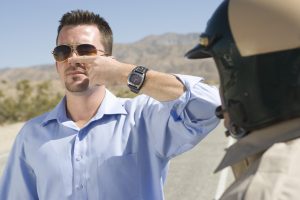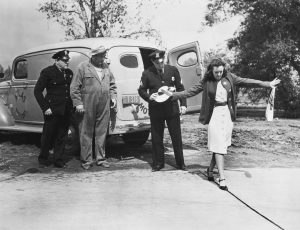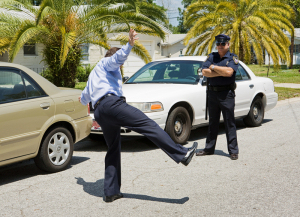 An Ohio man was involved in a single-car accident. Officers responded to the accident scene and suspected the man was under the influence. The officers requested that the man perform field sobriety tests, and the man refused. He was then charged with Operating a Vehicle under the Influence (OVI). What happens when an OVI suspect refuses to perform field sobriety tests in Ohio?
An Ohio man was involved in a single-car accident. Officers responded to the accident scene and suspected the man was under the influence. The officers requested that the man perform field sobriety tests, and the man refused. He was then charged with Operating a Vehicle under the Influence (OVI). What happens when an OVI suspect refuses to perform field sobriety tests in Ohio?
Articles Tagged with Field Sobriety Testing In Ohio DUI/OVI Cases
New Study Addresses Usefulness of Field Sobriety Tests Used in Ohio
 An article published earlier this month addresses the accuracy of field sobriety tests (FSTs). A team of researchers set-out to evaluate the effectiveness of FSTs for identifying drivers under the influence of THC. The researchers conducted clinical trials involving THC use, field sobriety testing, and driving simulations. The clinical trials showed the FSTs do not effectively discriminate between people who are impaired and people who are not impaired.
An article published earlier this month addresses the accuracy of field sobriety tests (FSTs). A team of researchers set-out to evaluate the effectiveness of FSTs for identifying drivers under the influence of THC. The researchers conducted clinical trials involving THC use, field sobriety testing, and driving simulations. The clinical trials showed the FSTs do not effectively discriminate between people who are impaired and people who are not impaired.
Blood Test Clears Sober Parent of DUI and Child Endangering
 Imagine you are totally sober, but your child’s daycare calls the police and reports you may be intoxicated. Imagine further the police make you perform field sobriety tests while your toddler is running around on the sidewalk. Now imagine you are prosecuted for DUI (called ‘OVI’ in Ohio) and Child Endangering and your child is taken away from you for two months, only for a blood test to show no alcohol or drugs, because you were totally sober. Katie Slayton does not have to imagine it: it happened to her. Her experience was the perfect storm of circumstances in a DUI/OVI investigation.
Imagine you are totally sober, but your child’s daycare calls the police and reports you may be intoxicated. Imagine further the police make you perform field sobriety tests while your toddler is running around on the sidewalk. Now imagine you are prosecuted for DUI (called ‘OVI’ in Ohio) and Child Endangering and your child is taken away from you for two months, only for a blood test to show no alcohol or drugs, because you were totally sober. Katie Slayton does not have to imagine it: it happened to her. Her experience was the perfect storm of circumstances in a DUI/OVI investigation.
Court Disbelieves Officer And Concludes Arrest Was Unlawful In Ohio DUI/OVI Case
 The credibility of a law enforcement officer makes a difference in court. Judges seem to presume officers are credible. Officers, however, can ruin their credibility with unprofessional conduct, uncorroborated claims, and unconfirmed clues. The trooper in a recent Franklin County case did just that, and it resulted in the court of appeals concluding the trooper’s arrest of the defendant was unlawful.
The credibility of a law enforcement officer makes a difference in court. Judges seem to presume officers are credible. Officers, however, can ruin their credibility with unprofessional conduct, uncorroborated claims, and unconfirmed clues. The trooper in a recent Franklin County case did just that, and it resulted in the court of appeals concluding the trooper’s arrest of the defendant was unlawful.
When Is A Bath Robe Evidence Of DUI / OVI In Ohio?
 We all remember learning in school the Fourth Amendment is the one which requires police to get a warrant to search your house or arrest you. That bullet point is great for helping kids learn the basics of their Constitutional rights; but, in practice, Fourth Amendment law is far more complex and far less certain. The complexity and uncertainty is illustrated by two recent Ohio DUI / OVI cases in which the same court looks at two very similar cases and comes to completely opposite conclusions.
We all remember learning in school the Fourth Amendment is the one which requires police to get a warrant to search your house or arrest you. That bullet point is great for helping kids learn the basics of their Constitutional rights; but, in practice, Fourth Amendment law is far more complex and far less certain. The complexity and uncertainty is illustrated by two recent Ohio DUI / OVI cases in which the same court looks at two very similar cases and comes to completely opposite conclusions.
A Major Misconception About SFSTs In Ohio DUI/OVI Cases

During a recent OVI jury trial, the judge and I disagreed about the function of standardized field sobriety tests (SFSTs). During a sidebar, I argued the tests do not measure driving impairment; they predict blood alcohol concentration (BAC). The judge’s opinion was SFSTs measure impairment of driving ability. The judge’s opinion prevailed, despite being wrong, because the judge’s opinion always prevails in the judge’s courtroom (unless and until an appellate court says otherwise). This particular judge is intelligent, well-intentioned, and better educated on DUI/OVI issues than most judges and lawyers. If this judge misunderstands the purpose of SFSTs, it’s a topic worth addressing.
Arrest Theorem For Ohio DUI/OVI Cases: FST ≠ PC
 Fourth amendment law does not lend itself to mathematical formulas. Rather than using equations to decide Constitutional issues, courts look at the totality of the circumstances and make decisions on a case-by-case basis. This is particularly true when it comes to the issue of whether an officer had probable cause to justify an arrest. However, one theorem illustrated by a recent Ohio OVI case is this: clues on Field Sobriety Tests (FSTs) does not equal Probable Cause (PC).
Fourth amendment law does not lend itself to mathematical formulas. Rather than using equations to decide Constitutional issues, courts look at the totality of the circumstances and make decisions on a case-by-case basis. This is particularly true when it comes to the issue of whether an officer had probable cause to justify an arrest. However, one theorem illustrated by a recent Ohio OVI case is this: clues on Field Sobriety Tests (FSTs) does not equal Probable Cause (PC).
When Are Police Permitted To Give Field Sobriety Tests?
 Imagine you are driving home on a central Ohio freeway after a late dinner and you are pulled over by a police officer. The officer says you were stopped for failing to use your turn signal when you changed lanes. The officer announces he smells the odor of alcohol and asks if you have been drinking. You did have a glass of wine with dinner. The officer then asks you to get out of the car for some field sobriety tests to “make sure you’re okay to drive”. Under what circumstances is the officer justified in doing this?
Imagine you are driving home on a central Ohio freeway after a late dinner and you are pulled over by a police officer. The officer says you were stopped for failing to use your turn signal when you changed lanes. The officer announces he smells the odor of alcohol and asks if you have been drinking. You did have a glass of wine with dinner. The officer then asks you to get out of the car for some field sobriety tests to “make sure you’re okay to drive”. Under what circumstances is the officer justified in doing this?
You Don’t Want A Ride From ARIDE Officers
 If you get a ride from an ARIDE officer, it’s because you’ve been arrested for DUI/OVI. The acronym stands for Advanced Roadside Impaired Driving Enforcement, and ARIDE is a course which some police officers complete to improve at investigating and prosecuting Ohio DUI/OVI cases involving drugs. To better understand what officers are learning at ARIDE, I recently completed the program myself, and I expect it to improve my effectiveness in defending cases involving driving under the influence of drugs.
If you get a ride from an ARIDE officer, it’s because you’ve been arrested for DUI/OVI. The acronym stands for Advanced Roadside Impaired Driving Enforcement, and ARIDE is a course which some police officers complete to improve at investigating and prosecuting Ohio DUI/OVI cases involving drugs. To better understand what officers are learning at ARIDE, I recently completed the program myself, and I expect it to improve my effectiveness in defending cases involving driving under the influence of drugs.
 Columbus OVI/DUI Attorney Blog
Columbus OVI/DUI Attorney Blog

